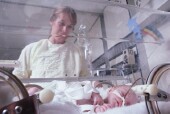
WEDNESDAY, May 30 (HealthDay News) — Children who suffered from a lack of oxygen during birth and who received whole-body cooling fared better than those who weren’t given the treatment, a new study shows.
Although rare, the condition can result in brain damage and death. However, putting infants into a state of hypothermia by temporarily lowering their body temperature seems to help the brain repair itself, the researchers report.
“Children [who were] cooled at birth, at 6 to 7 years of age had a lower frequency of death or IQ below 70,” said lead researcher Dr. Seetha Shankaran, director of neonatal/perinatal medicine and a distinguished professor of pediatrics at Wayne State University School of Medicine, in Detroit.
The researchers noted that the difference in IQ was not statistically significant, but the survival difference was.
“There was protection of the brain from lack of oxygen and lack of blood flow by hypothermia from the time the infants were born all the way through to 6 to 7,” Shankaran said.
The risk of death or disability was greatest among those who had the most initial damage, she added.
“Cooling is not completely protective, but among children who had moderate injury, the incidence of low IQ was only 47 percent, compared to 62 percent of the controls,” she said.
“Cooling is now being practiced throughout the United States and we can be reassured that the benefits are seen in infancy are going to persist,” Shankaran added.
Oxygen deprivation during birth, also known as neonatal hypoxic-ischemic encephalopathy, occurs in roughly one in every 1,000 births in the United States. It can result when the umbilical cord becomes wrapped around the infant’s neck or if it is pinched by the infant’s shoulder, among other causes. This cuts off circulation of oxygen and blood to the infant and results in damage to the brain and other organs.
Cooling slows down the metabolic processes of the body and prevents toxins from causing more damage while allowing the body to heal, Shankaran explained.
The report was published in the May 31 issue of the New England Journal of Medicine.
This study is a follow-up to an earlier study that found cooling reduced the rate of deaths and disability in infants when they were 18 to 22 months old.
In the new trial, 208 children with the condition were randomly assigned to cooling or not within six hours after birth.
Those cooled had their body temperature reduced to around 92 F for three days and then slowly rewarmed.
The children were evaluated again when they were 6 and 7 years old. The researchers looked specifically for deaths and IQs below 70.
The researchers found that for the 190 children for whom data were available, 47 percent in the cooling group had IQs below 70, compared with 62 percent among those who were not cooled.
Among those who had been cooled, 28 percent had died, compared with 44 percent of those who hadn’t, they found.
Moreover, either death or severe disability occurred in 41 percent of those cooled, but in 60 percent of those not cooled, the researchers noted.
Dr. Howard Heiman, associate chief of the neonatal intensive care unit at Cohen Children’s Medical Center of New York, said that “we know that brain cooling offers about a 15 percent improved chance to have a good outcome.”
“But, we were worried that a good outcome in the short term, in the long term there would be hidden damage. We have a big sigh of relief that we are not causing more damage,” he said.
Cooling is “not a silver bullet, but it gives us an edge without worsening the chances of bad survival,” Heiman said.
More information
For more information on birth defects, visit the U.S. National Library of Medicine.

